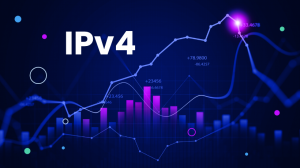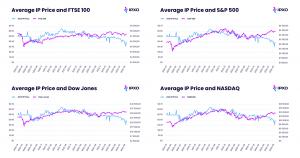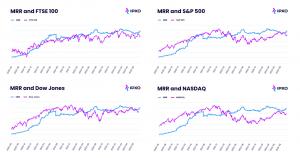IP Addresses: From Networking Tools to Valuable Financial Assets Linked to Macroeconomics
According to data from 2020 to 2023, IP addresses have evolved into highly sought-after financial assets that closely align with global economic trends.
The growing imbalance between supply and demand has profoundly transformed IP addresses from oblivious technical resources into highly coveted financial commodities.”
LONDON, UK, October 31, 2023 /EINPresswire.com/ -- A recent analysis conducted by the Data Science team at IPXO has uncovered that Internet Protocol (IP) addresses, the underlying digital identifiers that enable connectivity across networks, have quietly transformed from purely technical resources into highly coveted financial commodities closely linked to the overall state of the global economy. — Dainius Luksta, Chief Data Scientist at IPXO
Historically viewed as basic networking tools, IP addresses are now actively traded on the open market much like stocks or commodities, with their pricing dynamics directly mirroring the rises and falls of major macroeconomic indicators.
Research done by IPXO, an all-in-one Internet Protocol platform, provides a crucial perspective into the surging worldwide financial value of IP addresses as digital assets intrinsically tied to the broader economic climate.
FROM OBLIVIOUS TECHNICAL ASSETS TO COVETED FINANCIAL COMMODITIES
“During the early decades of internet proliferation, obtaining IPv4 addresses was relatively simple through basic requests to the Regional Internet Registries (RIRs) that managed their allocation,” explains Dainius Luksta, Chief Data Scientist at IPXO.
“However, with the IPv4 address pool now fully exhausted, we have entered an unprecedented era of scarcity. This growing imbalance between supply and demand has profoundly transformed IP addresses from oblivious technical resources into highly coveted financial commodities.”
Today, public IP addresses routinely trade for nearly $60 each – a staggering four-fold increase from average prices of around $15 per address back in 2014. This dramatic valuation clearly demonstrates the marked progression of IP addresses from ordinary networking tools to premium digital assets carrying tremendous financial value.
“The psychology of scarcity plays a major role in driving this perception shift,” analyzes Luksta. “Much like precious resources such as gold or diamonds, scarcity fuels the perception of inflated value and worth for IP addresses, despite no underlying change in intrinsic utility.”
IP ADDRESS PRICING CLOSELY MIRRORS SHIFTS IN BROADER ECONOMY
Extensive data analysis, conducted by the Data Analysis Team of IPXO during the last quarter of 2023, has unveiled compelling insights into the intricate relationship between IP address pricing dynamics and larger macroeconomic trends spanning the past decade. The analysis of 2020-2023 data has provided us with a nuanced understanding of how IP address values closely mirror fluctuations in major economic indicators, including the S&P 500, NASDAQ, Dow Jones, and FTSE 100.
When we delve into the data, a striking pattern emerges. During periods of robust economic growth and rising share prices, there is a corresponding surge in demand for IP addresses, resulting in higher trading and lease costs.
Notably, IPXO analysis highlights a pronounced correlation between the S&P 500 index and average IP address prices. In contrast, during economic downturns and recessions that lead to declining stock indices, IP address values tend to decline due to reduced demand.
“However, these correlations are not just limited to market trends; they extend to the very core of our operations. The remarkable stability we have identified in IP address pricing dynamics, with a notable exception observed during a specific summer period when the economy grew while IP prices declined, speaks volumes about the evolving financial status of IP addresses,” says Luksta.
The intimate interplay between IP address price movements and the broader economic landscape provides unequivocal indicators of the perceived financial value of these digital assets. This connection further bolsters the notion that IP addresses have truly become an integral asset class within the global economy.
THE SYMBIOSIS OF IP PRICING AND MRR
Equally significant is the connection between IPv4 sale prices and the broader economic landscape, which not only underscores the perceived financial value of these digital assets but also illuminates a profound relationship between our role as an IPv4 provider and Monthly Recurring Revenue (MRR). This relationship extends to how MRR is influenced by stock market fluctuations.
A distinctive alignment between IPXO’s MRR and the FTSE 100, the UK’s largest index, sets itself apart among various financial indices.
“Our client base, primarily operating within a project-based framework, exhibits sensitivity to the prevailing economic conditions. Their demand for IP addresses is intimately tied to project execution, inevitably leading to fluctuations in churn rates and, subsequently, MRR,” observes Luksta.
This nuanced connection between stock market fluctuations and MRR unveils invaluable insights for fellow IPv4 providers and IP-related companies, aiding in the comprehension of their performance within the global economy.
PREPARING FOR THE NEW DIGITAL ECONOMY REALITY
“It is becoming critically important for forward-thinking businesses to recognize the transformed commodity status of IP addresses and integrate IP management strategies into their core financial planning,” remarks Luksta.
Organizations that successfully leverage these insights stand to gain immense advantages by capitalizing on IP addresses as highly valued digital assets within an increasingly digitalized economy.
Luksta advises that companies must shift their mindset to view IP usage costs not as discretionary expenses, but as essential, planned budget allocations akin to office rentals, equipment, or payroll.
Amazon’s impending hourly IPv4 pricing model, expected to cost around $43 per address annually, seems to be emerging as a benchmark for “fair value” leasing rates in the industry. This further reinforces the relative stability and predictability of the IP address market compared to more volatile assets.
“While forecasting the nuanced shifts of this market may seem daunting initially, the underlying forces of supply, demand, and scarcity that drive pricing provide a reliable framework for making smart projections,” explains Luksta. “Enhancing internal address governance processes to treat IP resources as integrated financial components is key for businesses to prepare for the digital future.”
ABOUT IPXO
IPXO is a leading IP address management platform, providing services to ISPs, telcos, hosting providers, and others. The company is at the forefront of addressing industry challenges such as IPv4 shortage, IPv6 adoption, management obstacles, IP defragmentation, and routing automation. With potential access to a vast number of 3.3M IPv4 addresses and a strong presence within the RIR community, IPXO is emerging as the business-critical infrastructure platform for enterprises worldwide. For more information, visit www.ipxo.com.
Agne Srebaliute
IPXO LLC
email us here
Visit us on social media:
LinkedIn
Twitter
YouTube



